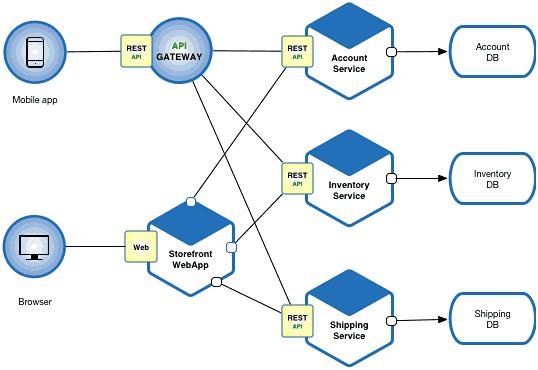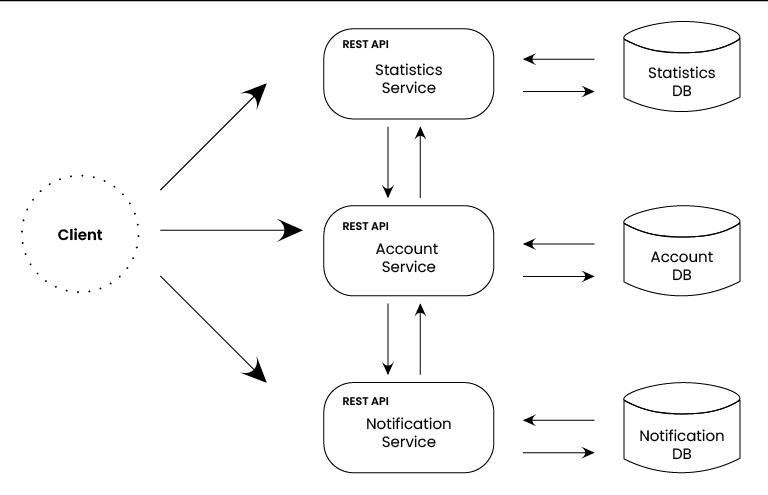- Home
- Blog
- Microservices
- Microservices Projects and Use Cases

Microservices is the architecture that software developers adopt to break down complex applications into small and individual components. This approach accelerates the software development lifecycle and helps to manage individual software components efficiently.
If you are planning to kick-start a career in microservices, then learning microservices projects is extremely important. In this blog, we will look into various critical microservice projects that will level up your hands-on skills in microservices to new heights.
Let’s learn them!
Table of Contents
- What are Microservices
- Why Microservices Projects
- Prerequisites for Microservices Projects
- Skills you will develop
- Real-time Microservices Project Ideas
- Summary
- FAQs
What are Microservices?
Microservices are a collection of services that you can deploy and manage independently. In general, the services are loosely coupled. The services communicate with external applications with lightweight APIs. Moreover, microservices support quick software development, offer good scalability, and much more.

Know that Microservices are also called microservice architecture. This architecture helps developers to develop large-scale applications. Not only that, but it also helps deploy and update the applications rapidly. Microservices don’t need to share their codes among the services.
Okay! We hope that you have got an overview of microservices. Next, we will discuss the importance of microservices projects in the coming section.
| If you like to Enrich your career with a Microservices certified professional, then visit Mindmajix - A Global online training platform: “Microservices Training” Course. This course will help you to achieve excellence in this domain. |
Why Microservices Projects
AmbitionBox says a microservices developer in India can make over 8 LPA on average. At the same time, senior developers can earn around 16 LPA on average. According to Glassdoor, on average, microservice developers can make over 109k USD annually in the USA. Not only that, but senior developers can earn around 140k USD on average.
The above statistics show that you will have a bright future if you enter the microservices career. If you improve your hard skills in microservices, you will undeniably stay ahead of the crowd in the job market.
How can you improve your hands-on skills in microservices? The right answer is microservices projects. Yes! You can enhance your practical skills to high levels by working on various microservices projects.
Now, a question may come up in your mind – is there anything to learn in advance before working on microservices projects?
Yes! The following section will list the requirements in detail.
Prerequisites for Learning Microservices Projects
You must acquire some basic skills before you start practicing microservices projects.
Let’s see the requirements one by one:
- Basic knowledge of microservices architecture, design patterns, and load-balancing strategies.
- Exposure to DevOps and Agile methodologies.
- Decent understanding of RESTful API development and security strategies
- Proficiency in programming languages such as Node.JS, Java, and Python.
- Familiar with databases like SQL and NoSQL.
- Exposure to containerization technologies like Kubernetes and Docker
Sure! Working on microservices projects will be a cakewalk if you acquire the above skills perfectly.
Now, a crucial question may emerge in your mind - what skills will I gain by practicing microservices projects?
Well! We shall explore the skills in the below.
Skills that you will develop
By working on microservices projects, you will develop multiple skills in software development, deployment, integration, and more.
Let’s take a look at them below.
- Mastery to design, implement, and maintain microservices architecture
- Strong expertise in developing and deploying applications.
- Proficient with Test Driven Development (TDD), Domain-Driven Design (DDD), and Continuous Integration (CI).
- Good exposure to Containers, Dockerfile, and Docker registries.
- Sound knowledge of making distributed transactions on databases.
- Proficiency in using Kubernetes APIs to interact with many clusters
- Strong communication and collaboration skills
Good! Coming up is the microservices projects section.
Let’s dive in!
Microservices Projects
MindMajix‘s expert team has compiled microservices projects for both beginners and experienced. It will help you to jump on to the right section and work on the projects based on your expertise level.
Let’s be ready!
Microservices Projects for Beginners
In this section, you will go over the basic-level microservices projects. The projects will help you become familiar with the NodeJS framework, Java Spring Boot, Go language, and many more.
- Currency Conversion
In this project, you will develop a currency converter. To do so, you will use the Go language and NodeJS platform. This project uses the gRPC to establish the currency converter application. Here, gRPC is a high-performance remote procedure protocol.
Working on this project will teach you to create a gRPC server using the Go language. Similarly, you will learn to create a gRPC client using the NodeJS framework. This project will familiarize you with protocol buffers. Besides, it helps define a service interface and data types.
- Vehicle Tracking System
This project is about tracking vehicles based on microservices-compliant architecture. You will develop an application that will monitor the statuses of vehicles closely. The application also uses a data store to store vehicle statuses, owner, and passenger details.
Learning this project will make you proficient with CI/CD concepts and APIs. You will learn to use environmental sensors in this project. Besides, you will get familiar with deploying loosely coupled microservices independently.
- Enterprise Planner
This project is about developing a powerful enterprise planner with microservices. This microservice project uses a front-end, which is built using AngularJS. The main thing is that every microservice of this application will contain its own database.
By practicing this project, you will gain mastery in building microservices using ASP.NET Core web API. You will also learn to use the open package management console in Visual Studio. You will become familiar with changing the connection string in the settings. Further, you can learn to migrate your database through this project.
- Warehouse Microservice
This project helps you to construct a warehouse API using microservice architecture. In this project, you will use the Spring Cloud configuration server, Spring Cloud stream, API gateway, messaging, and many more.
Completing this project will expose you to spring boot components such as caching, HATEOAS, and i18n. You will learn to work with containerization tools like Docker and Docker Compose. You will get expertise in dealing with databases like MongoDB and MySQL.
- Healthcare Information Service
This microservice project helps to overcome the challenges faced by healthcare services. Challenges in healthcare may occur because of seasonal illnesses and demographic factors. This application efficiently exchanges data between the different components of the microservices. Each microservice in the application will help to manage the various aspects of healthcare services. For example, appointment scheduling, bills, medicine, etc., are controlled by services individually.
Practicing this project will expose you to decoupling and modularization processes. You will also learn to share various data, such as patient, diagnostic, medication, etc., between the services seamlessly.
Great! You have learned how microservices architecture supports developing vital applications and the skills you will acquire in detail.
Microservices Projects for Experienced
This section unpacks many powerful projects that will help elevate your microservices skills to greater heights.
- Shopping Cart Application
In this project, you will develop a shopping cart application based on microservices architecture. This project uses Spring Boot and Spring Cloud to build this application.
Working on this project will familiarize you with MySQL containers, RabbitMQ, dashboards, and many more. You will learn to develop different microservices such as catalog, inventory, customer service, shopping cart user interface, and more.
- Piggymetrics
This microservices project helps to develop an application for users to manage personal finances efficiently. This application comprises three core components. You can deploy the components separately for the efficient utilization of the application.

By completing this project, you will get great exposure to working with the MongoDB database and RabbitMQ. Here, RabbitMQ is a robust message-broker software. Also, you will learn about Spring Cloud, Spring Boot, and Docker Container while working on this application.
- IoT Device Management
This project overcomes the challenges faced by IoT devices. The challenges occur because of the complexity created by heterogeneous platforms. In this project, you will construct a data pipeline to send data by IoT devices. You can employ a messaging platform like Kafka to send the data.
By working on this project, you will be familiar with monitoring the performance of IoT devices using dashboards. It is possible to master collecting data using the tool ‘telegraf’ through this project. Using this project, you will apply Machine Learning models to analyze data and derive better insights.
- Spring Pet Clinic Application
This project is developed based on the microservices architecture with Spring Boot and Spring Cloud. The big thing about this project is that it uses Spring Cloud Gateway, Spring Cloud Circuit Breaker, and Open Telemetry in this project. It helps to split applications into many microservices.
By doing this project, you will get exposure to configure databases in detail. Learning to use the in-memory database to populate with data is possible through this project. You will become familiar with starting microservices locally without using a Docker container. You will also learn to begin services with Java and Docker-Compose.
- Movie Recommendations
This microservices project uses a Spring Cloud-native platform. The platform helps develop the movie recommendation application. This project uses Spring Cloud and Docker containers to build the application. This project includes service discovery servers like Netflix Eureka.
By learning this project, you will learn to perform integration testing with Docker, polyglot persistence, API gateway, service discovery, etc. You will learn to integrate data through a message bus.
- Human Resources Management System
In this project, you will develop an HRMS to manage employees and vacancies effectively. This application allows viewing desired results by applying filters. Also, you can create, delete, and update records in the HRMS.
By practicing this project, you will become familiar with Java programming. You will get exposure to the Maven dependency manager and learn to update Spring Boot configurations. Besides, this project allows learning to work with the MySQL database.
Congrats! You have gained a holistic knowledge of microservices applications through the above-explained projects.
Learning is not a one-time job, but it must be continuous. So, to master microservices architecture, you must work on numerous projects to become a competent microservices developer. Coming up is the section that lists many crucial real-time microservices project ideas.
Real-Time Microservices Project Ideas
The following are the various real-time Microservices project ideas. They will help you boost your Microservices skills.
- Train ticket management system
- Blockchain-based microservices
- AI-powered microservices ecosystem
- Microservices for renewable energy management
- Microservices for content recommendation
- Microservices for generic data analysis
- Microservices for virtual events
- Online streaming system
- Courier management system
- Social networking system
Of course! If you practice the above real-time project ideas, it will elevate your Microservices skills.
Summary
- Microservices is an architecture that helps to break down complex applications into small pieces of software.
- Microservices provide isolation to software components and allow them to work independently.
- Working on microservices projects will hone your hard skills exceptionally.
- You will be thorough in microservices implementation, APIs, CI/CD pipelines, and many more by working on microservices projects.
- You can strengthen your portfolio by working on multiple microservices projects.
Microservices Project FAQs
1. What are the types of microservices?
From a broader perspective, microservices are classified into two major types: stateful microservices and stateless microservices.
2.What are the differences between Microservices and SOA?
SOA is nothing but a service-oriented architecture. On the other hand, Microservices are the subset of SOA and the fine-grained SOA.
SOA is a design approach with which you can build application architecture based on services. On the other hand, SOA supports decentralization, isolation, and more.
3. What are the different types of microservices API?
Below are the various types of microservices API.
- Public API
- Partner API
- Private API
- Database API
- Remote API
- REST API
- SOAP API
4. What are the main components of microservices?
The following are the main components of microservices.
- Containers and Clusters
- Service Delivery
- API Gateway
- Circuit Breaker
- Enterprise Service Bus
- Load Balancer
5. What are the key advantages of microservices?
Below are the critical advantages of microservices.
- Microservices provide enhanced scalability.
- It supports CI/CD.
- It performs fault isolation.
- It improves resiliency to high levels.
- It provides good security.
Conclusion
Let’s wrap it up! We hope that this blog has helped improve your skills to greater heights. According to a recent survey of Research and Markets, the microservices market is projected to grow rapidly from 5.31 billion to 10.86 billion USD by 2027. It shows that stepping into the microservices career with polished skills will be highly rewarding.
Well! MindMajix is the leading eLearning provider that offers advanced microservices training for aspirants. You can take a microservices course and get a certification. You strengthen your portfolio by adding microservices project samples and certification. It will leg up to crack your microservices interviews easily. No doubt it will advance your microservices career journey in leaps and bounds.
 On-Job Support Service
On-Job Support Service
Online Work Support for your on-job roles.

Our work-support plans provide precise options as per your project tasks. Whether you are a newbie or an experienced professional seeking assistance in completing project tasks, we are here with the following plans to meet your custom needs:
- Pay Per Hour
- Pay Per Week
- Monthly
| Name | Dates | |
|---|---|---|
| Microservices Training | Feb 21 to Mar 08 | View Details |
| Microservices Training | Feb 24 to Mar 11 | View Details |
| Microservices Training | Feb 28 to Mar 15 | View Details |
| Microservices Training | Mar 03 to Mar 18 | View Details |

As a Senior Writer for Mindmajix, Saikumar has a great understanding of today’s data-driven environment, which includes key aspects such as Business Intelligence and data management. He manages the task of creating great content in the areas of Programming, Microsoft Power BI, Tableau, Oracle BI, Cognos, and Alteryx. Connect with him on LinkedIn and Twitter.















